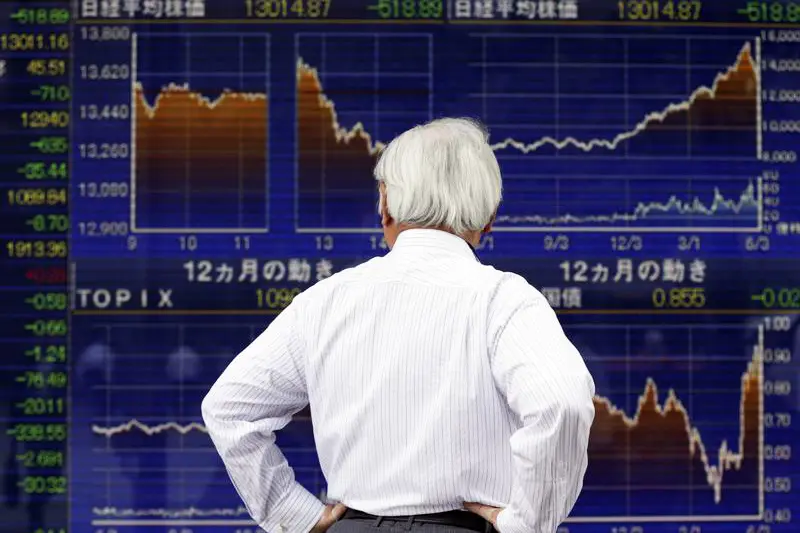PHOTO
By Claire Milhench
LONDON, Feb 23 (Reuters) - Emerging equities powered to fresh 19-month highs on Thursday after U.S. Federal Reserve minutes suggested the Fed would hold off a March rate hike, while the South African rand briefly hit a one-week high after Wednesday's budget.
MSCI's benchmark emerging stocks index
.MSCIEF
rose 0.2 percent, with Indian shares
.NSEI
up 0.5 percent to hit the highest since March 2015, Turkish stocks
.XU100
up 0.7 percent and Bucharest shares
.BETI
up 0.2 percent at a fresh nine-year high.
Hong Kong shares touched a new 5-1/2-month high
.HSI
, reassured by a run of relatively robust Chinese data.
Emerging stocks have gained over 10 percent year-to-date, helped by improving macroeconomic data in emerging and developed markets, and higher commodity prices, which are helping commodity exporters to reduce current account deficits.
"Global data is still looking quite strong and that bodes well for EM as a whole," said Kiran Kowshik, an emerging markets strategist at Unicredit. "Iron ore is still trading quite strong - so long as the global economy is showing signs of recovery, we really like the commodity exporter currencies."
Appetite for riskier assets was also supported by U.S. Federal Reserve minutes indicating that uncertainty over President Donald Trump's planned tax cuts and spending plans would deter the Fed from raising rates in March.
Currencies made gains even in the face of a stronger dollar, with the South African rand
ZAR=
up 0.3 percent to briefly touch a one-week high a day after a budget that targeted high earners with a new tax to curb the deficit.
South African five-year credit default swaps also slipped 3 basis points (bps) from Wednesday's close to 192 bps, according to Markit data, a one-week low.
"The budget went without any accident. Ratings agency S&P said it seems to tick all the right boxes as of now. The market is probably trying to price in that you won't get a June downgrade. That was a big concern for the market and that's coming off," Kowshik said.
Finance Minister Pravin Gordhan, who has been under pressure to quit from some sections of the ruling party, said it was up to President Jacob Zuma to fire him, but that his record spoke for itself.
The Turkish lira
TRY=
was steady at near 1-1/2-month highs and the Russian rouble
RUB=
gained 0.2 percent, helped by a 1.5 percent rise in oil prices
LCOc1
.
The South Korean won
KRW=
edged up after the Bank of Korea kept rates unchanged at 1.25 percent, a record low, in the face of declining consumer confidence and political turmoil. Korean stocks
.KS11
were trading at their highest level since July 2015.
But the Polish zloty
EURPLN=
slipped 0.25 percent against the euro, underperforming its emerging European peers, after unemployment rose.
Czech crown bond yields
CZ10YT=RR
slipped, with five-year yields touching one-week lows
CZ5YT=RR
after JPMorgan said Czech crown-denominated government bonds would join its GBI-EM emerging markets benchmark at the end of April. The move is likely to spur inflows from index-tracking funds.
Nigeria's naira steadied in the non-deliverable forwards (NDF) market after Tuesday's sharp falls, amid confusion over whether authorities would follow through on signals that the currency could be devalued.
Six-month NDFs
NGN6MNDFOR=
showed the naira trading at around 379 per dollar, after blowing out to 397 per dollar on Tuesday. The official rate is around 305
NGN=
.
(Editing by Gareth Jones) ((claire.milhench@thomsonreuters.com; +44)(0207 542 3571; Reuters Messaging: claire.milhench.thomsonreuters.com@reuters.net))
LONDON, Feb 23 (Reuters) - Emerging equities powered to fresh 19-month highs on Thursday after U.S. Federal Reserve minutes suggested the Fed would hold off a March rate hike, while the South African rand briefly hit a one-week high after Wednesday's budget.
MSCI's benchmark emerging stocks index
Hong Kong shares touched a new 5-1/2-month high
Emerging stocks have gained over 10 percent year-to-date, helped by improving macroeconomic data in emerging and developed markets, and higher commodity prices, which are helping commodity exporters to reduce current account deficits.
"Global data is still looking quite strong and that bodes well for EM as a whole," said Kiran Kowshik, an emerging markets strategist at Unicredit. "Iron ore is still trading quite strong - so long as the global economy is showing signs of recovery, we really like the commodity exporter currencies."
Appetite for riskier assets was also supported by U.S. Federal Reserve minutes indicating that uncertainty over President Donald Trump's planned tax cuts and spending plans would deter the Fed from raising rates in March.
Currencies made gains even in the face of a stronger dollar, with the South African rand
South African five-year credit default swaps also slipped 3 basis points (bps) from Wednesday's close to 192 bps, according to Markit data, a one-week low.
"The budget went without any accident. Ratings agency S&P said it seems to tick all the right boxes as of now. The market is probably trying to price in that you won't get a June downgrade. That was a big concern for the market and that's coming off," Kowshik said.
Finance Minister Pravin Gordhan, who has been under pressure to quit from some sections of the ruling party, said it was up to President Jacob Zuma to fire him, but that his record spoke for itself.
The Turkish lira
The South Korean won
But the Polish zloty
Czech crown bond yields
Nigeria's naira steadied in the non-deliverable forwards (NDF) market after Tuesday's sharp falls, amid confusion over whether authorities would follow through on signals that the currency could be devalued.
Six-month NDFs
(Editing by Gareth Jones) ((claire.milhench@thomsonreuters.com; +44)(0207 542 3571; Reuters Messaging: claire.milhench.thomsonreuters.com@reuters.net))





















